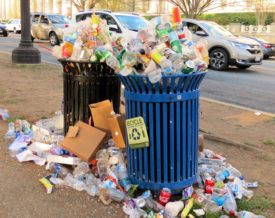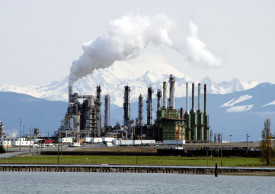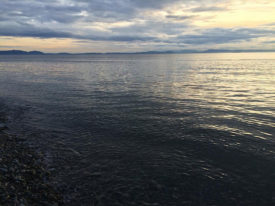OK, let’s consider just how absurd this predicament is. People are terrestrial creatures. We like to eat salmon, which spend most of their lives in the ocean. Fortunately, salmon have a habit—nay, an instinct—of returning to fresh water to spawn. They do this every year. Used to be, people would wait for them in rivers and estuaries, and catch them there, close to home.
But then—perhaps to jump the queue and get ahead of the crowd unfurling its nets in rivers and bays—some fishermen started to troll for salmon in the offshore waters. The salmon still had every intention of swimming into our rivers where they are easier to catch. But instead, trollers began baiting their gear and enticing salmon to take their hooks at sea.
As long as salmon runs are abundant, this impatient practice can be written off as one of those idiosyncrasies of our species, yet another method we have devised to needlessly burn diesel fuel. “Technology is needed not to beat the fish, but to beat other fishermen,” wrote Richard Manning in Salmon Nation. “The fish would still come back… if we would wait.”
But when certain stocks of salmon start to weaken, this reliance on ocean trolling shows its weakness as well. This week, the Pacific Fishery Management Council is weighing its options in the face of a predicted low run of Klamath River chinook. Biologists estimate that 29,000 salmon would make it to the mouth of the Klamath in the absence of any fishing—already well below the 35,000 minimum that fisheries managers have set as an annual goal to reach the spawning grounds.
At sea, those scarce Klamath-bound fish mingle with other chinook headed for rivers with more abundant runs—such as the Sacramento, where runs have rebuilt over the last decade. Regulators fear that trollers would hook Klamath fish among their catch, a chinook that would be indistinguishable on deck from a fish headed for the Sacramento, Eel, or Rogue river.
So the council is entertaining a proposal to nix this year’s salmon fishing season along 700 miles of coastline, from Point Sur, near Monterey, California, north into Oregon. Their dilemma has set off a round of finger-pointing, with trollers blaming water diversions from the Klamath for the salmon’s woes on that river, and hence for the possible closure of the fishery. No doubt, in the long term, the water regime on the Klamath needs to change.
But in the meantime, maybe we should change how we fish. Ocean trolling is inherently indiscriminate. As long as some salmon populations are less robust than others, either some stocks will be overfished or many will go under-caught. Instead, if fishing boats sought salmon at the mouths of the rivers they’re returning to, there’d be a much smaller risk of catching a fish from any other run. In California, commercial fishing inside the Golden Gate, at the mouth of the Sacramento-San Joaquin River, has been illegal since 1957. The present situation might offer a reason to move forward by turning back the clock half a century.







